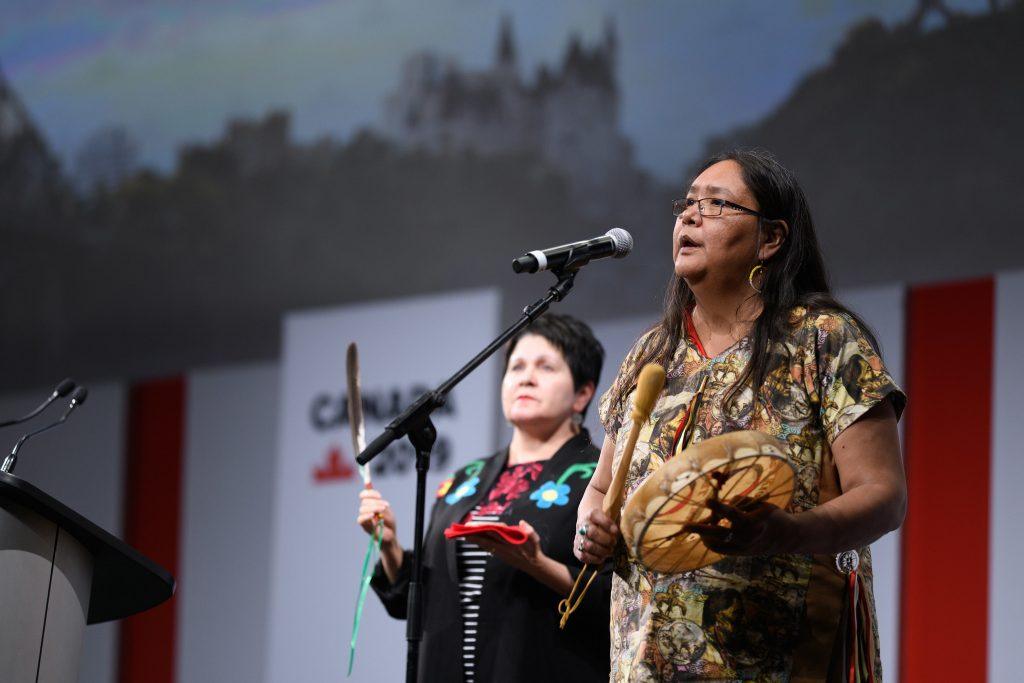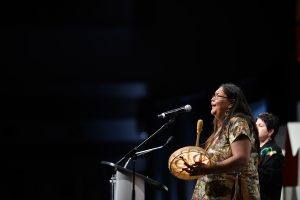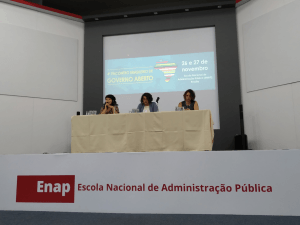Opening Debate: Challenges for Practicing Feminist Open Government in Brazil
When Brazilian civil society organizations, including Article 19 Brasil, started being part of regional and international conferences and conversations on open government, they felt that a Brazilian approach was necessary. These organizations needed a national space for sharing experiences and perspectives on how public policies could be democratically improved around the country, with special efforts in tackling inequality. Working with national open government was the solution we found for the inclusionOGP participating governments are working to create governments that truly serve all people. Commitments in this area may address persons with disabilities, women and girls, lesbian, gay, bisexual, tr... More of historically marginalized groups in policy-making. That’s how the Brazilian Open Government Summit began.
Now in its fourth edition, in late November 2019, Brasília hosted the Fourth Brazilian Open Government Summit (EBGA in Portuguese), a two-day event that engaged civil society organizations and members, scholars and public servants to discuss and foster initiatives in open government and its main pillars – transparencyAccording to OGP’s Articles of Governance, transparency occurs when “government-held information (including on activities and decisions) is open, comprehensive, timely, freely available to the pub... More, civic participation, accountability and innovation. Many hands helped make the EBGA an engaging space shared by a range of voices, proposals, and experiences regarding environmental law, access to justiceAccessible justice systems – both formal and informal – ensure that individuals and communities with legal needs know where to go for help, obtain the help they need, and move through a system tha... More, local open government, and genderOGP participating governments are bringing gender perspectives to popular policy areas, ensuring diversity in participatory processes, and specifically targeting gender gaps in policies to address gov... More.
Even though the main focus of the Summit was to build a diverse space for several perspectives on open government, some challenges (and, therefore, opportunities) will need to be addressed in future editions. It is time to bring an intersectional approach to this event, as gender, race and ethnicity are fundamental for promoting OGP.
At the event, there was only one workshop on how transparency can promote women’s rights – especially regarding sexual and reproductive health and rights and the right to live a life free from violence. Initiatives, such as the Legal Abortion Map (a website that gathers information on how and where women can access legal abortions) and the Gender-based Violence Map (a website that gathers data on violence against women in Brazil) were presented. That scenario presents itself not only as a challenge to be overcome, but as an opportunity to be explored. In line with OGP’s focus on advancing gender and inclusion in the Partnership, Brazil should continue increasing the number of workshops, talks and activities that promote the inclusion of women, especially women of colour and the LGBTQI community.
A first step was taken, though. All sessions were mainly composed by women – from workshops on local open government to roundtables on water accountability – a direct reflection of the staff’s efforts to do so – a staff mostly composed by women. The main goal was to shed a light on women who work in the open government space and its correlated issue areas.
Therefore, this opportunity/challenge invites us to ponder if this difficulty in finding space to discuss gender-related issues in open government could be the lack of official commitments that put women and LGBTQI community not only as a focus, but also as main participants in its co-creation and implementation at both national and local levels, for Brazilian action plans. Considering women’s difficulties in accessing technology, especially those from indigenous and quilombola communities, is one way to build a more inclusive open government. Diversifying tools to support both commitmentOGP commitments are promises for reform co-created by governments and civil society and submitted as part of an action plan. Commitments typically include a description of the problem, concrete action... and action planAction plans are at the core of a government’s participation in OGP. They are the product of a co-creation process in which government and civil society jointly develop commitments to open governmen... co-creation and implementation is key.

Indigenous leaders of the Algonquin Community in Canada kicking off the OGP Global Summit in May 2019.
Creating an action plan that takes into consideration gender, race, ethnicity and sexuality-related issues has been a major topic in past OGP Summits – such as the last one in Ottawa, in May 2019. In this year’s event, all participants were invited to think about how to be more gender-responsive in the implementation of commitments and action plans. For instance, there was a whole session dedicated to promoting indigenous and quilombola women’s right to informationThe legal right to request information from the government allows the public to follow government decision-making, participate in ensuring better decisions, and hold the government accountable. Techni..., showing the importance of engaging those women in the process to tackle not only natural gender barriers in access to information, but also geographical and linguistic ones.
From what we have learned in Ottawa and Brasília, we can imagine a Brazilian Open Government Summit that can mainstream intersectional race and gender issues into the conversations in open government. It is urgent that communities that have not been engaged in the co-creation processCollaboration between government, civil society and other stakeholders (e.g., citizens, academics, private sector) is at the heart of the OGP process. Participating governments must ensure that a dive... have the opportunity to join and promote their ideas for improving gender, race, sexuality and ethnicity equity in our democracies.
No comments yet
Related Content
 Challenges and Solutions
Challenges and Solutions Expanding Inclusion in Open Government for First Nations, Quilombola and Indigenous Women
Since 1995, the 9th of August is commemorated as the International Day of the World’s Indigenous Peoples, to take cognizance of the specific needs of Indigenous communities and First Nations.


Leave a Reply